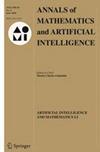An abstract view on optimizations in propositional frameworks
Abstract
Search/optimization problems are plentiful in scientific and engineering domains. Artificial intelligence has long contributed to the development of search algorithms and declarative programming languages geared toward solving and modeling search/optimization problems. Automated reasoning and knowledge representation are the subfields of AI that are particularly vested in these developments. Many popular automated reasoning paradigms provide users with languages supporting optimization statements: answer set programming or MaxSAT or min-one, to name a few. These paradigms vary significantly in their languages and in the ways they express quality conditions on computed solutions. Here we propose a unifying framework of so-called weight systems that eliminates syntactic distinctions between paradigms and allows us to see essential similarities and differences between optimization statements provided by paradigms. This unifying outlook has significant simplifying and explanatory potential in the studies of optimization and modularity in automated reasoning and knowledge representation. It also supplies researchers with a convenient tool for proving the formal properties of distinct frameworks; bridging these frameworks; and facilitating the development of translational solvers.

 求助内容:
求助内容: 应助结果提醒方式:
应助结果提醒方式:


